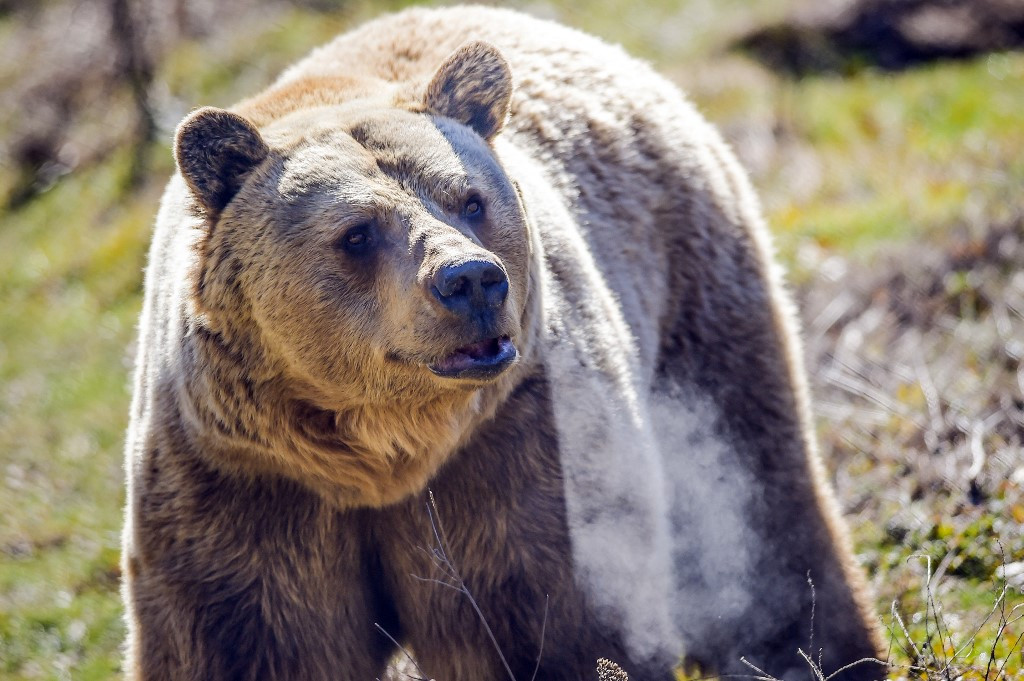Popular Reads
Top Results
Can't find what you're looking for?
View all search resultsPopular Reads
Top Results
Can't find what you're looking for?
View all search resultsKosovo's abused 'restaurant bears' move to greener pastures
Change text size
Gift Premium Articles
to Anyone
H
aving only just woken up from hibernation, a brown bear named Ero lazily strolls between the trees under a snow-capped mountain in central Kosovo, enjoying life alongside his chubby partner Mira.
Yet just eight years ago, he was a so-called "restaurant bear" -- chained up in front of an eatery, forced to drink alcohol and serve as entertainment for customers in a bizarre and cruel practice that was popular in Kosovo after its late 1990s war with Serbia.
Ero is one of nearly 20 bears rescued from that abuse who now live in a rolling 16-hectare (40-acre) refuge near the capital Pristina, replete with trees, berry bushes, ponds and artificial dens.
Named the Pristina Bear Sanctuary, it is a rare conservation success story in Kosovo, where poverty, corruption and political crises are still overwhelming the former Serbian province 13 years after it declared independence.
That leaves the environment low on the scale of priorities, with plastic bags a common sight along rivers and roadsides, while coal plants pump black smog into the sky outside Pristina.
"From the beginning, it was clear to us that saving bears was only the first phase of a larger project, to raise awareness of the need to defend the wild," said Afrim Mahmuti, director of sanctuary.
"Kosovo belongs to us, its environment, too, we are responsible for it", he added.
Tense rescues
The story of the sanctuary began after a group of Austrian soldiers deployed as part of KFOR -- a NATO force in Kosovo -- were shocked by the sight of bears trapped in cages for the amusement of restaurant patrons.
They alerted their embassy in 2011, who then urged local authorities to stop the practice.
Eventually it was agreed that Austrian NGO Four Paws would create a refuge on land provided by the municipality of Pristina.
The harder part turned out to be rescuing the bears from their owners.
The tense operations were carried out under the protection of special police forces supported by KFOR soldiers, recalled Dardan Gashi, who was minister of the environment at the time and a key champion of the project.
"Some of the owners were members of the former (pro-independence) guerrillas, they thought they were invulnerable and imagined we wouldn't dare go there," he told AFP.
In one case, an owner "killed three bears before we arrived", Gashi added.
Before their transfer, the animals had to be tranquilised "because they were also very aggressive", and for some, getting off the alcohol -- which was used by owners to sedate the bears -- was challenging.
Papa bear
The first resident of the sanctuary was Kassandra, a brown bear that had been abandoned in a cage in front of a restaurant when the owner closed the business.
She was in "terrible shape, in a metal cage no larger than two-by-three metres, exposed to the elements without any protection or shelter," said Roswitha Brieger, the wife of the former Austrian ambassador to Pristina, Johann Brieger, and a key player in the project.
For months, the bear was living in her own excrement, surviving off of food brought by locals who took pity.
Mustafe Gashi, a mellow 57-year-old who works at the sanctuary, recalls how Kassandra's arrival in early 2013 earned him the nickname "Papa Bear".
Despite his current reputation as an animal lover, Gashi was brought up in the rural highlands and therefore taught to be on guard with wildlife.
"When I was a kid, the (adults) used to scare us by telling us that the bears were going to eat us," he told AFP.
But while waiting for construction of the sanctuary to be completed, Gashi, who was originally hired as a security guard, offered to sleep in a building next to the one where Kassandra was housed.
He regularly checked on his neighbour's well-being, and developed a loving relationship.
"I saw that the bears did not eat us", he laughed.
Gashi also recalled bottle-feeding three wild cubs who were brought to the sanctuary after their mother was killed.
"Never in a million years would I have imagined holding a bear in my arms and raising it like my children," he said, explaining that he "never took care" of his two sons "like he took care of the bears."
Success story
The site's core mission has been achieved -- since 2014, there have been no more cases of detained bears in Kosovo, said director Mahmuti, whose next project is to find a home for a lion and wolves that were held illegally.
The sanctuary employs about 30 people and its operating costs, some 400,000 euros ($480,000) annually, are funded in large part by Four Paws.
The year before the pandemic, the site welcomed some 40,000 visitors, mostly families and students.
"It's a success story," said Milot Kurshumlia, a 39-year-old environmental activist who hopes it "won't be the last."
"We can see how useful the interaction between institutions, civil society and wildlife defenders is."











